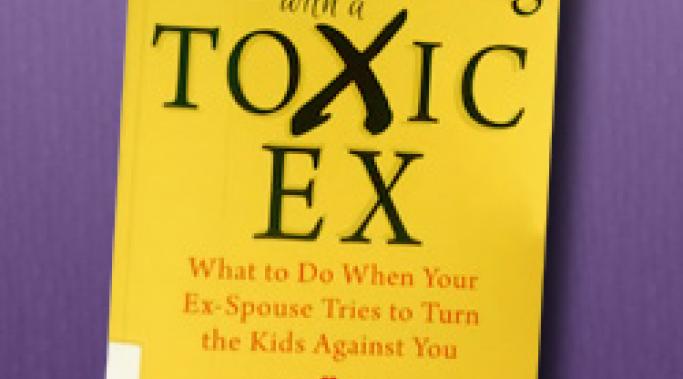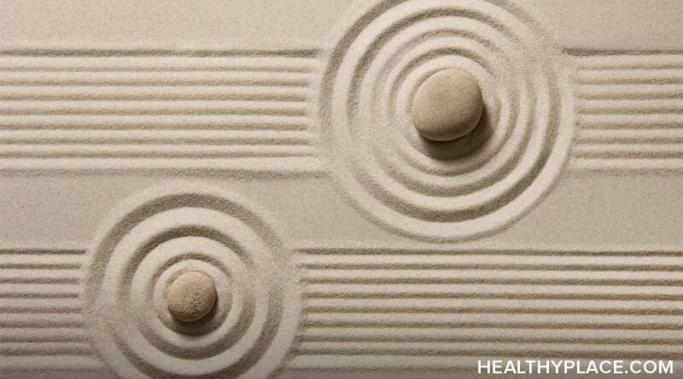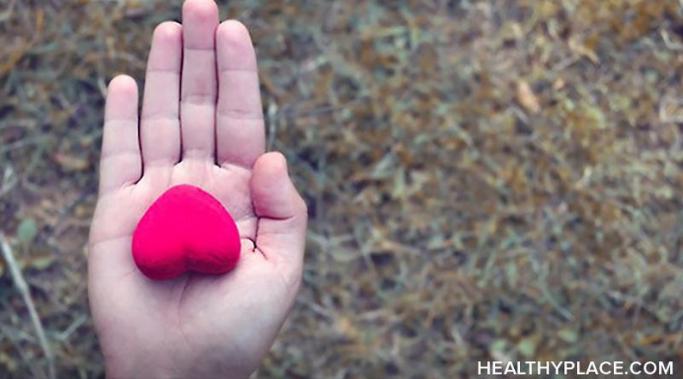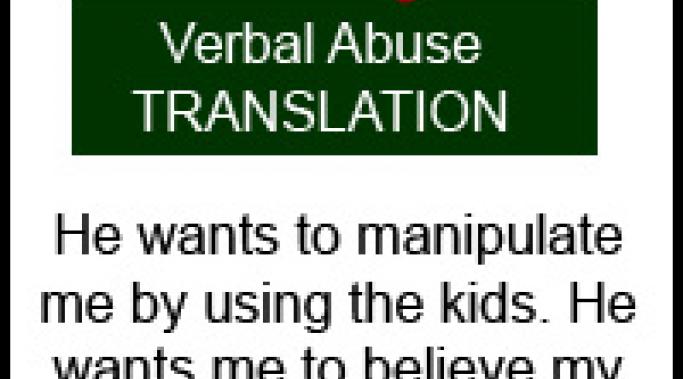Description of A "Toxic Ex"
A toxic ex is any co-parent who creates a loyalty conflict for your child(ren). Loyalty conflicts occur when your child believes they must choose one parent over the other.
A toxic ex will do things like:
Restrict or hinder communication and/or contact between you and your children.
Talk badly about you to your children.
Erase and Replace You (This phrase comes from Co-parenting with a Toxic Ex and means to ". . . erase you from your child's heart, mind, and memory and install someone else . . .").
Undermine you.
Persuade your kids to not trust you and urge them to betray your trust (the "divide and conquer to maintain control" routine).
Signs and Symptoms of Abuse
Last year, I did a top ten list of the most viewed Verbal Abuse in Relationships blog posts, so I thought I'd do something different this time. The posts on this list earned the largest percentage of comments per times viewed. If you missed them, perhaps you want to add your two cents. Readers tell me all the time they get as much from the comments as they get from the post, so share your experience so we can ALL benefit!
I tried to write this post earlier today, but evidently there were some comments and stories I needed to read first. Stories from addicts, ministers and other abuse survivors reminded me of how much I used to fight my abuser. I fought with my ex-husband so often that I accepted some isolation to spare myself the embarrassment of fighting in front of his friends. At the end, I think every one of the people my ex hung out with knew that I couldn't stand to look at him.
No wonder they believed his stories that I was miserable and unstable. I couldn't open my mouth without something negative about my ex sliding out. My feelings for him surrounded me like a prickly heat and they made me seem like someone I was not. Ugly. Hateful. Mean. My feelings for my ex made it easy for his friends to feel sorry for him, give him a place to stay, and believe his side of whatever story he told.
So often, people ask me the question "Am I imagining the abuse? Is it just in my head or is there a problem with my marriage?" Sure, sometimes problems are just in our heads, and we might also make mountains out of molehills. I suppose you could be imagining problems where there are none, and you could be imagining abuse. But if outside of your relationship your judgment seems sane, then I really doubt you are imagining the abuse. More likely, the effects of abuse are messing with you.
Unconditional love can't make an abuser change. In an abusive relationship, unconditional love sets the stage for more abuse. Even so, many abuse victims believe that unconditional love must make the abuser stop abusing. Nothing is stronger than love, right? Victims think things like:
"But I love her (so I stay)."
"He had a horrible childhood (so I stay)."
"She never learned how to love (so I stay)."
"I want to show her that someone in her effing life cares (so I stay)."
"He is really sick and has no one else but me (so I stay)."
Unfortunately, unconditional love has a razor sharp edge that will make you bleed. It could even kill you. Nothing is stronger than love. So wasting your empathy on an abuser by affording him or her with unconditional love can be your death sentence.
A lifetime ago, as I sat on my bed unable to put my feet on the floor and get going, I cried to myself, "I am better than this! I deserve more than this!" I knew intellectually that my relationship with my husband Will caused me great harm, but I couldn't quite get my emotions and my mind to align. My head told me to RUN, but my emotions cemented my feet in place. The best I could to get out of that bed was to tell myself that today I would get through to Will. Today would be the day I led Helen Keller to the water pump . . . today Will would understand. Today, my husband would change and we would break through the walls between us. Today I would get it right.
On May 3, I arrived at my sister's home in Texas. I left Marc (19) and Eddie (17) behind in North Carolina despite my breaking heart. Financially, I simply couldn't afford to pretend "it will all work out" any longer. Codependency kept me there, financial ruin forced me to move.
In hindsight, I wish I'd left a year ago before life became more difficult for my oldest son. My staying allowed him one more year of destroying himself with drugs in his safe and protected environment - my home. I feel like a fool for enabling Marc and falling into the habit of codependency. I thought I'd already learned that lesson from his father in that substance addiction always wins over good sense. The rope I gave Marc to hang himself twisted around my neck instead, suffocating me and separating me from my inner safe place.
Big ol' belly laughs that catch you by surprise feel so good! They feel better now that feeling happy doesn't make me sad. That idea is confusing; laughing until you cry doesn't usually mean you cry sad tears, but it happened to me a lot during my abusive marriage. Usually, the laughing started during a phone call with my sister. Anything could get us going, and for a few beautiful minutes, nothing mattered except the funny bit between us. I laughed until my sides ached and the tears flowed like water.
But then, when the laughter dried up and I started wiping the tears from my eyes, the tears wouldn't stop. My face, sore from smiling, suddenly dropped into a frown. I covered my face because I felt embarrassed to feel so...damn...sad. Those last tears fell because when the laughter was done, I returned to my sad, closed-off life of mind-numbing pain. Sometimes I would stay on the phone with her when she asked what was wrong. Usually I cut the conversation short when I felt the change to pain begin.
It seems that the courts would have more sense when it comes to co-parenting with any abuser, but especially a proven-in-a-court-of-law abuser found guilty of domestic violence, child abuse, or any sexual crimes. There is a disconnect between criminal court and family court that endangers our children with the mistaken belief that two parents, of any sort, is preferable to protecting our children from dangerous people.
And yet, many of us find ourselves co-parenting with our abusers.
The fear caused by abuse is an emotion that can stick with you during abuse and after the abusive relationship is over too. One of the hardest things to look at during or after an abusive relationship is the mental and emotional damage the abuse caused in us. We remember who we were before the abuse and may feel like a sad shell of that person after it. It is scary and heart-breaking. You may feel more defenseless, helpless and hopeless than before you knew your partner abused you. After all, now you fight your mind as well as the abuse your (ex) partner inflicts.
You will never change your partner. You are already their target for abuse, and once you are the target it is difficult if not impossible to change back into "you" in their eyes. However, you can change yourself. You can change your thoughts, your feelings, and the way your brain is wired. But remember, although "change" is something that can happen to you, if you want to heal from abuse, change must be something you DO.









